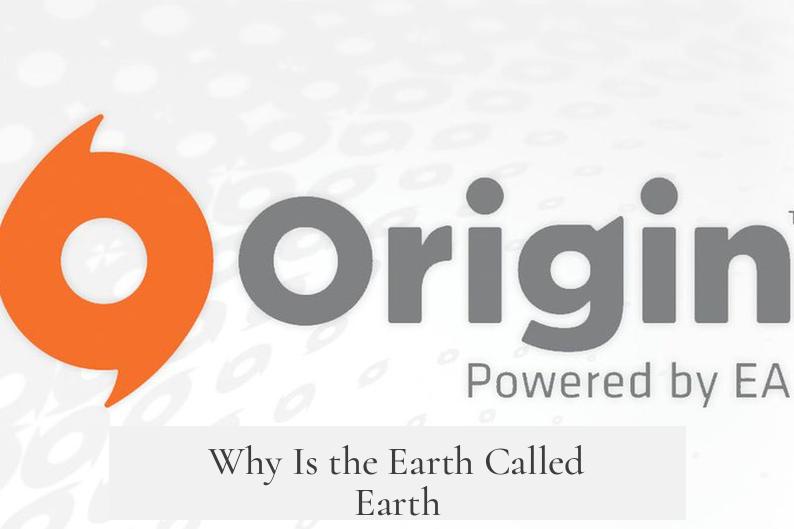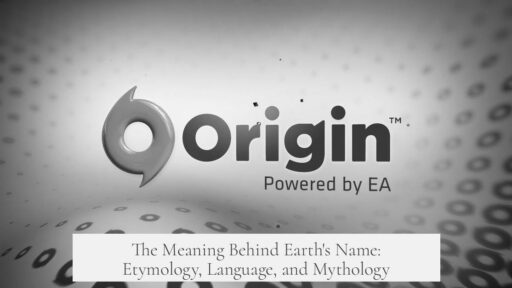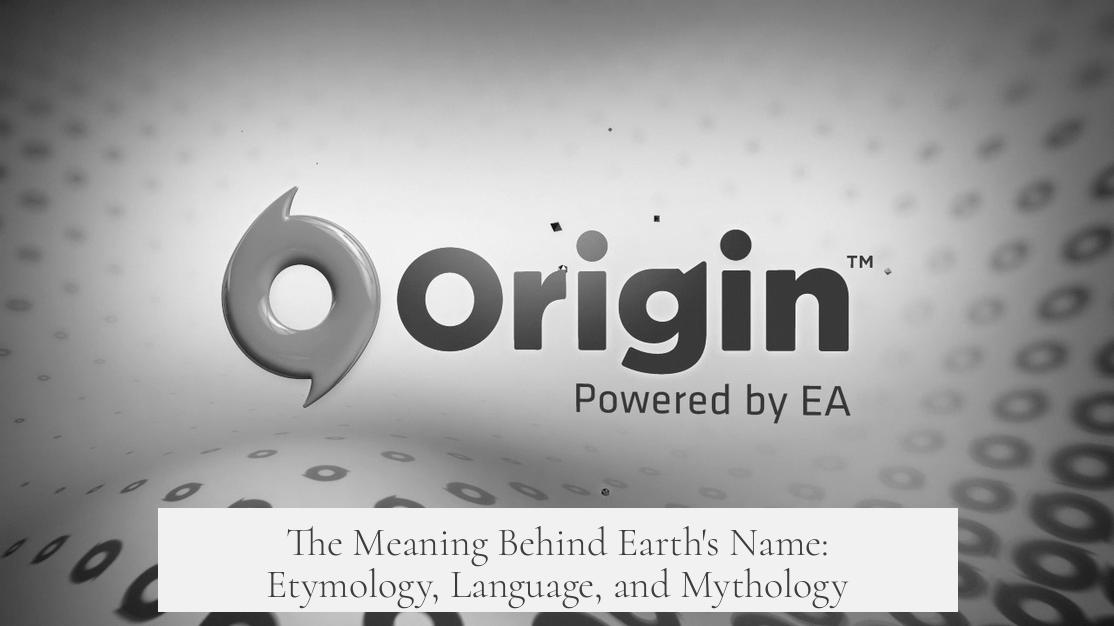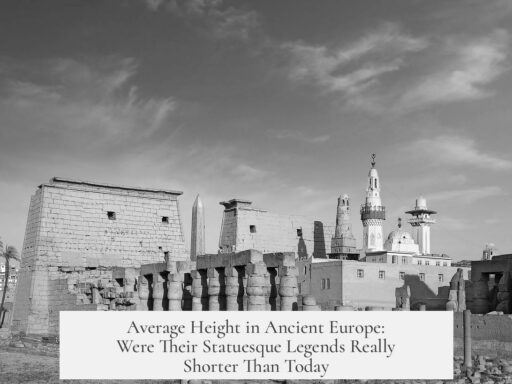The Earth is called Earth because its name originates from the Old English word eorþe, which means ‘ground,’ ‘soil,’ or ‘dry land.’ This term stems from the proto-Indo-European root er-. Unlike other planets in the solar system, Earth’s name is rooted in the everyday language of early Germanic-speaking peoples, reflecting their direct interaction with the terrestrial world rather than celestial bodies observed through scholarly study.
The Old English eorþe (pronounced roughly “eh-orth-uh”) signified not only the physical ground but also the material world in contrast to the heavens or underworld. Its German cognate, Erde, shares the same meanings, denoting “earth” or “ground.” Similarly, Icelandic and Old Norse use Jörðin, which means “the Earth” in a feminine form and is closely related phonetically and conceptually to the English word.
There is also a mythological association linked to the name. The old Norse goddess erþo (pronounced “ertho”), representing the Earth or “Mother Earth,” connects the word to fertility and abundance. Another Germanic goddess, Hertha or Nerthus, carries a name resonant with the sound and symbolic meaning of Earth as a life-giving force. These mythological figures reflect how ancient cultures personified the planet as nurturing and generous.
In linguistic and cultural terms, the reason Earth, along with the Sun and Moon, has Germanic roots rather than Latin ones is tied to the social structure and language history of England. Early common folk, who spoke Old English, interacted regularly with the planet beneath their feet. They naturally used their native terms for these familiar objects.
The other planets were discovered and named later by Latin- and Norman French-speaking clergy and aristocracy. These scholars had access to expensive telescopes and scientific education that allowed them to classify and name celestial bodies. Hence, the names of the other planets often derive from Latin or classical mythology, while Earth retained its Germanic origins due to its fundamental role in daily human life.
This linguistic dichotomy reflects a pattern observed in English, where common words often come from Germanic roots and formal or scientific terms derive from Latin or French. For example, English speakers use Earth to refer to our planet but may use Latin-derived names when engaging in formal astronomy or scientific discussion.
When comparing with other languages, the variation highlights cultural and linguistic differences. Italian uses Terra
for Earth, a word with Latin roots, in contrast to the English naming lineage. Chinese names the planets based on the five classical elements, adding the word “star” to the planet’s element name, while Earth is described as the “earth/dirt sphere.”
Arabic speakers use the term ardh (ارض) for Earth, again illustrating how different linguistic histories shape planetary names across cultures. The International Astronomical Union (IAU) standardized planet names globally in 1919, but Earth retains a unique naming tradition reflecting humanity’s intimate and practical relationship with its own world.
These naming customs link back to human experience and observation rather than scientific classification. Earth, the ground beneath people’s feet, was part of everyday speech for ancient communities long before formal astronomical naming conventions arose.
Key points:
- The English word Earth comes from Old English eorþe, meaning ground or soil.
- Earth’s name has Germanic roots, unlike other planets named from Latin or classical sources.
- Early peoples named Earth based on direct interaction and daily experience.
- Mythological associations with Earth include Old Norse and Germanic goddesses of fertility and soil.
- Linguistic patterns reflect social class and language history in England: common words are Germanic, formal scientific terms are Latinate.
- Other languages use diverse roots for Earth, reflecting cultural and linguistic differences.
- The International Astronomical Union standardized planet names, but Earth’s name remains tied to its linguistic and cultural heritage.
Why Is the Earth Called Earth?

The Earth is called Earth because its name comes from the Old English word eorþe, which means ground, soil, or dry land. This word has deep roots in the proto-Indo-European term er-, connecting it to meanings related to the material world as opposed to the heavens or underworld.
Now that we’ve nailed down the root of this down-to-earth name, let’s dig a bit deeper—no pun intended—into why the word “Earth” feels so natural. How did this common name stick around when the other celestial bodies have names borrowed from Latin or Greek?
The Etymology: Where Dirt Meets Language
The word Earth isn’t just random gibberish. It’s got serious lineage. The Old English eorþe (pronounced roughly “eh-orth-uh”) means ground or soil. This meaning clearly relates to the dirt under our feet, a concept probably close to anyone’s heart who’s ever gotten mud on their boots.
The connection doesn’t stop there. In German, you’ll find the word Erde, which means earth or ground too. In Old Norse and Icelandic, the word Jörðin also shares a close phonetic relation and means the same thing. Even more interesting: the Old Norse goddess erþo (pronounced like “er-tho”) personifies the Earth—Mother Earth herself.
So, the name “Earth” carries both linguistic roots and mythological weight. It’s literally grounded in the soil and in old stories.
A Word From The Common People
The English language is a patchwork quilt of history and culture. Here’s a fun twist: the names for Earth, Sun, and Moon are Germanic rather than Latin because they were everyday words used by common folk—the peasants, farmers, and traders who lived and breathed these phenomena daily. When you wake up to sunshine and feel dirt between your fingers, you don’t call the sun Sol; you just say “the sun.” Simple.
Meanwhile, the planets farther afield—Mars, Jupiter, Venus—got their fancy Latin or Greek names because the learned elite named them. Scientists, clergy, and aristocrats, who spoke Latin and Norman French, used these formal languages to classify distant “wandering stars.”
Interesting, isn’t it? The roots of some words hint at who was talking about them. Earth’s name shows us that this planet wasn’t some distant dream—it was the everyday reality of people who tilled the soil and gazed upward.
Earth vs. The Other Planets: A Linguistic Class Divide

The difference in how Earth and the other planets got named offers a snapshot of social history. Just as in English, meat names (like beef from bœuf, a fancy French word) come from elaborate linguistic paths while the animals retained more Germanic roots, Earth is grounded in common language, not the scholarly realm.
This linguistic class contrast also reminds us: Earth was the baseline, the norm, our home turf. When ancient peoples noticed the “wandering stars” moving across the night sky, they didn’t lump our stable, familiar planet in with those distant dots right away.
The Global Picture: Earth’s Name in Other Languages
Earth doesn’t have the same name everywhere. In Italian, it’s Terra—which has its own classical, Latin vibe. Arabic speakers say Ardh (ارض), and in Chinese, Earth is often referred to as the “Earth/dirt sphere.” The first five Chinese planet names reflect the five classical elements, with stars appended—bringing in a philosophical spin rather than just a physical one.
The naming conventions show how different cultures relate to the planet. Some emphasize dirt, others elements, and yet they all circle back to the basics: the soil, the ground beneath our feet. Meanwhile, English keeps it straightforward with a word that evolved from common speech, rooted in the literal earth.
Earth and Mythology: The Goddess Within
Did you know there’s a goddess closely tied to the name Earth? Germanic traditions speak of Hertha, or sometimes Nerthus, a fertility goddess representing abundance and generosity—the kind of generosity Earth gives every day with crops, weather, and shelter.
This mythic angle adds a layer of cultural meaning to the name. It was more than dirt for ancient people; Earth was alive, a nurturing being worthy of respect. No wonder this name endured—it’s poetic in its simplicity.
Summing It Up: Earth’s Name Is a Story of Everyday Life
In the end, the Earth is called Earth because the word grew naturally from the languages of everyday people who lived on the ground, dealt with soil, farmed, and built homes. It’s a name that’s old, practical, and deeply cultural. It’s less about fancy celestial naming and more about what matters most: the land beneath us.
Searching for a name that fits a planet as vast and complex as Earth? Sometimes, the simplest answer is perfect. Our word for Earth tells a story about language, society, and the human connection to our home. It’s a name grounded in the past, yet it continues to define our place in the universe today.
“From the soil we come, and to the soil our name returns.” — An Ancient Linguist’s Missing Quote
So the next time you look down at the ground, remember: the word Earth itself has walked the journey of civilization with you, from ancient gods to dirt beneath your shoes. It’s a history lesson built right into the name you use every day.
Why is the Earth called Earth?
The word “Earth” comes from the Old English word “eorþe,” meaning ground or soil. It refers to the material world as opposed to the heavens or underworld.
How does the name Earth relate to other languages?
Earth has similar words in German (“Erde”), Old Norse (“Jörðin”), and Dutch. These all come from a shared ancient root that means ground or soil.
Why is Earth’s name Germanic rather than Latin like other planets?
Names like Earth, Sun, and Moon come from common speech used by everyday people. Other planets were named by scholars using Latin or French, reflecting class differences in language.
Are there mythological origins behind the name Earth?
Yes, there was a Germanic goddess named Hertha or Nerthus linked to fertility and the earth. Her name connects to the sound and concept of “Earth.”
How do different cultures name the Earth?
In Italian, Earth is “Terra.” In Arabic, it is “Ardh.” Chinese names use elemental and star terms rather than the word “Earth” directly.




